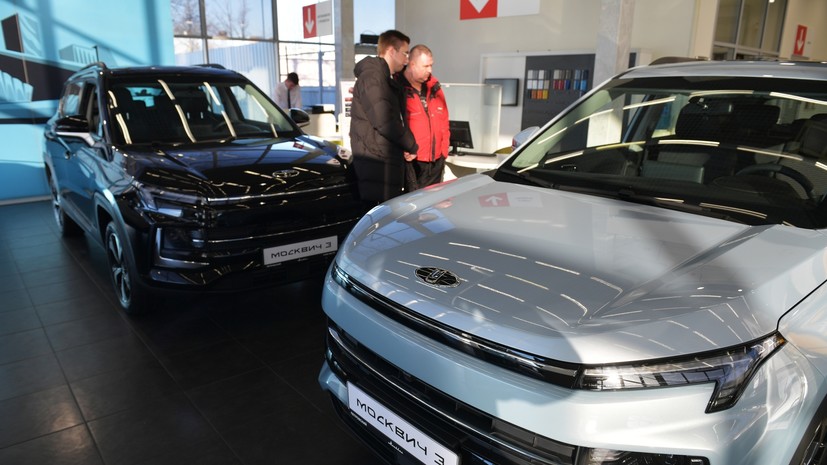The Russian authorities decided to extend the program of preferential car loans for certain categories of the population. This was reported on Thursday, March 30, by the press service of the Ministry of Industry and Trade.
"In 2023, it (the program. — RT) will continue to operate for groups of citizens who are most in need of support: medical workers, educators, mobilized, volunteers and military personnel under contract, taking part in a special military operation, as well as members of their families, "the department specified.
Under the terms of the initiative, the discount subsidized from the budget for the payment of the down payment on the loan will be 20% of the cost of the car, and for residents of the Far Eastern Federal District - 25%. It will be possible to take advantage of the benefit when buying a car of domestic production not more than 2 million rubles. In turn, the discount on Russian electric vehicles for all categories of borrowers will be 25%, but not more than 625 thousand rubles, the Ministry of Industry and Trade noted.
Recall, the program of preferential car loans was restarted in July 2022 to support the Russian car market. Initially, the initiative was supposed to end on December 20, 2022, but later the country's leadership announced its extension for 2023.
Nevertheless, in February of this year, the issuance of preferential loans was suspended, since the money allocated for the program in the amount of 5 billion rubles was completely spent, as stated by the President of AvtoVAZ Maxim Sokolov. Under the circumstances, budget funds were redistributed in such a way as to partially resume the provision of this demanded support measure, the Ministry of Industry and Trade said.
As Igor Morjaretto, a partner of the analytic agency AUTOSTAT, noted in an interview with RT, the program of preferential car loans showed its effectiveness last year. According to the expert, approximately 10% of all cars sold in the country were bought using this tool. Although now the initiative will continue to operate in a somewhat truncated format, in the future its conditions may be expanded again, the expert did not rule out.
"Under the new conditions now do not fall Russians, who previously could claim benefits under the programs "First car" and "Family car". Perhaps in the future there will be free money in the budget – and these initiatives will also resume. In general, the program of preferential lending seriously supports the market, which is still weak," the expert added.
Recovery phase
Last year, amid unprecedented Western sanctions and the withdrawal of many foreign brands from Russia, sales of new cars in the country fell by almost 59%. So, if in 2021 the Russians bought about 1.52 million cars from the conveyor, then by the end of 2022 the value decreased to 626 thousand.
- RIA Novosti
In addition, in the context of an uncertain situation in the economy, the Bank of Russia briefly raised the key rate to a record 20% per annum to combat inflation. This, in turn, led to a sharp increase in the cost of borrowed money and, as a result, a drop in the issuance of car loans in the country.
If in February 2022, Russians issued 66.5 thousand loans for the purchase of a car, then in March the figure fell more than four times - to 15.7 thousand.
However, with the normalization of the economic situation in Russia and the slowdown in inflation since mid-spring, the Central Bank began to gradually lower the key rate and in September returned it to 7.5% per annum. The actions of the Central Bank, together with the launch of the program of preferential car loans, made it possible to revive the interest of citizens in the purchase of vehicles.
As calculated in the NBKI, already in June the country issued 36.4 thousand loans for the purchase of cars, and in August - 48.9 thousand. In January 2023, the value rose to 53 thousand, but in February it fell slightly to 52.6 thousand.
"The situation can improve markedly when citizens feel an increase in incomes. Nevertheless, various preferential programs, including in the car loan market, are a good tool for stimulating demand. Just as preferential mortgages have maintained interest in buying housing in new buildings over the past few years, the state program of subsidized car loans is designed to help the car market recover, "Artem Deev, head of the analytical department of AMarkets, told RT.
- RIA Novosti
- © Alexander Kryazhev
It is noteworthy that, although automakers from unfriendly states began to stop selling and producing new cars in the Russian Federation, they are now being actively replaced by domestic models, as well as foreign cars from china. For example, in January 2023, among the new cars purchased in the country, 40.6% of the models belonged to Russian brands, and 38.1% to Chinese ones. For comparison: in January 2022, the values were only 20.3 and 9.6%, respectively, according to a study by AUTOSTAT.
In these conditions, according to the agency's baseline forecast, in 2023 sales of new cars in Russia may increase by 25% to 780 thousand units. At the same time, the optimistic scenario assumes an increase in the indicator by 39% - up to 870 thousand.
"Of course, the program of preferential loans, even in its current form, is a plus for the market. Nevertheless, as we believe, sales of passenger cars will be able to return to the level of 2021 only by 2027," Igor Morjaretto concluded.

